
GLOBAL GOVERNANCE
Scope & Guideline
Exploring the Intersection of Policy and Environment
Introduction
Aims and Scopes
- Multilateralism and Global Governance:
The journal focuses on the dynamics of multilateralism, exploring how states collaborate and compete within international institutions to address global issues. - International Security and Peacekeeping:
A core area of research includes the examination of international security frameworks, peacekeeping operations, and the challenges they face in a rapidly changing geopolitical landscape. - Human Rights and Human Security:
The journal investigates the intersection of human rights and security, emphasizing the importance of civilian protection and the role of international organizations in promoting human dignity. - Development Governance:
Research related to development policies, strategies, and practices, particularly in the context of the United Nations' Sustainable Development Goals and their implementation globally. - Climate Governance and Sustainability:
The journal addresses issues related to climate change governance, highlighting the challenges, responses, and international cooperation required to mitigate environmental impacts. - Emerging Powers and Global Order:
The journal explores the role of rising states and non-traditional actors in shaping the global governance landscape, particularly from the perspective of the Global South.
Trending and Emerging
- Post-Pandemic Governance:
The journal has increasingly focused on the implications of the COVID-19 pandemic for global governance, exploring institutional resilience, adaptability, and lessons learned for future crises. - Climate Change and Global Health:
There is a growing emphasis on the intersection of climate governance and health, particularly how environmental policies impact public health outcomes and global security. - Cybersecurity and Technological Governance:
Emerging themes around cybersecurity governance reflect the increasing importance of digital security in international relations, highlighting the need for a coordinated global response. - Human Rights in Conflict Zones:
An uptick in research addressing human rights issues in conflict situations indicates a trend towards understanding the complexities of protecting civilians amidst geopolitical turmoil. - Non-State Actors and Global Governance:
The role of non-state actors, including civil society and private sector organizations, is gaining prominence, reflecting a broader understanding of governance beyond traditional state-centric models.
Declining or Waning
- Traditional Power Structures:
Research centered on established powers and their dominance in global governance has decreased, with the journal increasingly focusing on emerging powers and alternative governance models. - Static Institutional Analysis:
There is a noticeable reduction in papers that merely analyze existing institutions without considering their adaptability or reform, as the journal emphasizes more dynamic and responsive governance frameworks. - Regionalism in Isolation:
Studies that treat regional governance as a standalone concept, rather than as interconnected with global governance mechanisms, have become less prevalent, reflecting a shift towards more integrated analyses. - Economic Governance without Context:
Research that examines economic governance in isolation from political, social, and environmental contexts is declining, as the journal seeks to contextualize economic issues within broader governance frameworks. - Historical Case Studies without Contemporary Relevance:
There is a waning interest in historical analyses that do not draw parallels or implications for current global governance challenges, as the journal aims to maintain relevance in contemporary debates.
Similar Journals
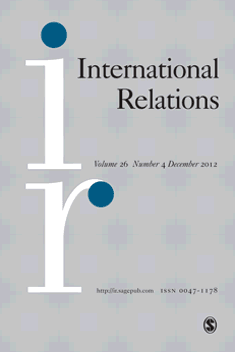
International Relations
Advancing global discourse in political science.International Relations is a premier journal dedicated to advancing the field of political science and international relations, published by SAGE Publications Ltd in the United Kingdom. With its ISSN 0047-1178 and E-ISSN 1741-2862, this journal has served as a critical platform for scholarly discourse since its inception, covering a wide range of themes from global governance to security studies. Having achieved a Q1 ranking in the 2023 category quartiles for Political Science and International Relations, it stands out among a selective group of influential academic publications, ranking #145 out of 706 in its field, placing it in the 79th percentile according to Scopus metrics. The journal operates under a traditional subscription model, catering to a diverse audience of researchers, academics, and professionals who seek to contribute to and engage with emerging ideas and debates. The objective of International Relations is to foster innovative research that addresses the intricate dynamics shaping international interactions, thus providing vital insights that inform policy-making and theoretical developments alike. As such, it remains an essential resource for anyone committed to understanding and influencing the future of global affairs.
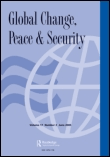
Global Change Peace & Security
Charting Paths to Peace Amidst Global TransformationsGlobal Change Peace & Security is a prominent scholarly journal published by Routledge Journals, Taylor & Francis Ltd, focusing on the intricate interplay between global change and peace efforts within the realms of political science and international relations. With an ISSN of 1478-1158 and an E-ISSN of 1478-1166, this esteemed journal spans from 2008 to 2024, consistently contributing to critical discourse in its field. Ranked in the second quartile (Q2) for both Political Science and International Relations as well as Sociology, it occupies a distinguished position with a Scopus ranking of 134 out of 706 and a percentile standing of 81st in Political Science. The journal’s objective is to bridge the gap between theoretical frameworks and functional policy discussions, thereby fostering dialogue that addresses contemporary challenges in global governance and human security. By offering rich, research-based insights and analysis, Global Change Peace & Security serves as a vital resource for academics, practitioners, and policy-makers committed to advancing peace and security amidst pervasive global transformations.
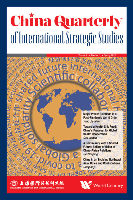
China Quarterly of International Strategic Studies
Advancing Understanding of China's Strategic InfluenceThe China Quarterly of International Strategic Studies, published by World Scientific Publishing Company, is an essential open-access journal dedicated to the interdisciplinary exploration of international strategic dynamics, particularly pertaining to China. Since its inception in 2015 and embracing the open-access model in 2018, this journal has aimed to foster rigorous scholarship in political science and international relations, providing a platform for in-depth research that bridges gaps between theory and practice. With a growing reputation reflected in its Q3 ranking in Political Science and International Relations and a Q4 ranking in Sociology and Political Science for 2023, the journal is positioned to contribute significantly to academic discourse. Researchers and professionals keen on the evolving geopolitical landscape will find valuable insights and analyses, thereby supporting their work and studies in this ever-relevant field. The journal is based in Singapore and provides a global forum for knowledge exchange.
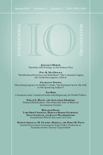
INTERNATIONAL ORGANIZATION
Championing Critical Research in a Changing WorldINTERNATIONAL ORGANIZATION, a prestigious journal published by Cambridge University Press, stands at the forefront of political science, law, organizational behavior, and sociology. Since its inception in 1947, this influential journal has fostered critical dialogue and research among scholars and practitioners, maintaining an impressive impact in the field, as evidenced by its Q1 rankings across multiple disciplines in 2023. With a robust Scopus rank placing it in the top percentiles of its categories, INTERNATIONAL ORGANIZATION serves as an essential resource for those engaged in understanding complex global issues, institutional frameworks, and human resource dynamics. Although it does not offer Open Access, it provides extensive insights that are invaluable for students, researchers, and professionals dedicated to advancing knowledge in international relations and organizational studies. For those looking to contribute to impactful scholarship, submissions to this journal provide a unique opportunity to influence the evolving landscape of these critical fields.
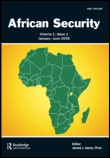
African Security
Advancing the discourse on Africa's security landscape.African Security is a prestigious academic journal dedicated to advancing the discourse on security studies within the African context. Published by Routledge Journals, Taylor & Francis Ltd, it serves as a leading platform for researchers and practitioners interested in the complex political and security landscape of the African continent. With an impressive impact factor and recognized status as a Q1 journal in Political Science and International Relations, it ranks among the top resources for current research in the field, positioned in the 86th percentile for Political Science and 72nd percentile for Safety Research within their respective categories. Although the journal does not currently offer Open Access options, its rich content, ranging from theoretical frameworks to empirical studies, addresses critical issues in security, policy-making, and international relations. Since its inception in 2008 and continuing through 2024, African Security remains an essential resource for those seeking to deepen their understanding of security dynamics in Africa, making it invaluable to students, policymakers, and scholars alike.
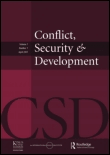
Conflict Security & Development
Bridging Disciplines for a Safer, More Developed WorldConflict Security & Development is a premier academic journal published by Routledge Journals, Taylor & Francis Ltd, focusing on the intricate intersections of conflict, security, and development in a global context. With a commitment to advancing critical scholarship, this journal serves as an essential resource for researchers, practitioners, and students in the fields of Political Science, International Relations, and Sociology. Achieving impressive rankings in both Q1 and Q2 categories for 2023, it holds prominent positions within its disciplines, including a commendable rank of #164 out of 706 in Political Science and International Relations and #395 out of 1466 in Sociology. Although it operates under a subscription model, the significant impact factor underscores its role in disseminating groundbreaking research and insights that address pressing global challenges. The journal's objectives include fostering interdisciplinary dialogue and promoting innovative approaches to understanding complex social phenomena, making it an indispensable publication for anyone invested in the nexus of security and development.
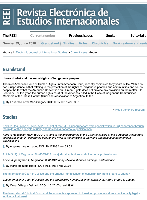
Revista Electronica de Estudios Internacionales
Exploring the Frontiers of International StudiesRevista Electronica de Estudios Internacionales is a prominent academic journal dedicated to the exploration of international studies, published by the esteemed ASOC ESPANOLA PROFESORES DERECHO INT & RELACIONES INT-AEPDIRI. Based in Spain, this journal has embraced an Open Access model since its inception in 2000, allowing researchers, students, and professionals to freely access and disseminate significant findings in the field. With an ISSN of 1697-5197, the journal highlights critical issues surrounding international law and relations, maintaining a vital role in the ongoing discourse within the academic community. Currently categorized as Q4 in the Law field and ranked #755 out of 1025 within the Scopus database, the journal offers a platform for innovative thinking and scholarly contributions, which are particularly important in today's rapidly evolving global scenario. Explore the latest research and insights from 2019 to 2023 in this essential resource for those engaged in the study and practice of international relations.
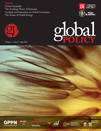
Global Policy
Connecting Ideas to Influence Global ChangeGlobal Policy is a prestigious journal published by Wiley, focusing on the intersection of economics, law, political science, and environmental science. With ISSN 1758-5880 and E-ISSN 1758-5899, this journal serves as a vital platform for researchers and practitioners to disseminate and discuss critical issues that shape global policy frameworks. Established in the United Kingdom, Global Policy has earned impressive rankings across various categories, including Q1 status in Law and Political Science, reflecting its influence and relevance within the field. The journal's commitment to rigorous scholarship and interdisciplinary dialogue is evident in its convergence of diverse topics from 2010 to 2024, making it a valuable resource for academics and policymakers alike. Though it operates without an Open Access model, the journal’s reputation is anchored by its significant impact factor and high H-index, ensuring that published works reach a broad audience. Researchers, professionals, and students will find Global Policy an essential source of insight and analysis on the pressing challenges of our time.
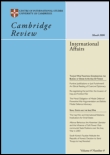
Cambridge Review of International Affairs
Connecting Research and Practice in International RelationsCambridge Review of International Affairs, published by Routledge Journals, Taylor & Francis Ltd, stands as a leading platform for scholarly discourse in the fields of Political Science and International Relations. Operating since 1986, this prestigious journal has firmly established itself in the academic community, evidenced by its commendable Q1 ranking and notable position in the 83rd percentile among Social Sciences journals according to Scopus rankings. With a commitment to exploring pressing global issues, the journal delivers rigorous analyses and diverse perspectives, making it an essential resource for researchers, practitioners, and students who strive to deepen their understanding of international affairs. Although the journal is not an Open Access publication, it ensures broad accessibility to its influential research, contributing significantly to the ongoing discourse in international relations until 2024 and beyond.
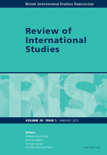
REVIEW OF INTERNATIONAL STUDIES
Navigating the complexities of global politics.REVIEW OF INTERNATIONAL STUDIES, published by Cambridge University Press, is a leading journal in the fields of Political Science and International Relations, with a robust focus on sociopolitical dynamics from a global perspective. Established in 1976, it has garnered a distinguished reputation, achieving a Q1 ranking in both Political Science and Sociology for 2023, underscoring its impact and relevance within the scholarly community. With an impressive Scopus ranking placing it in the 93rd percentile among peer journals in its field, this journal serves as an essential platform for researchers, professionals, and students engaged in critical analysis and discourse on international affairs. Although it does not currently offer Open Access options, the journal is committed to advancing knowledge through rigorous peer-reviewed research, contributing significantly to the academic dialogue surrounding global political issues.